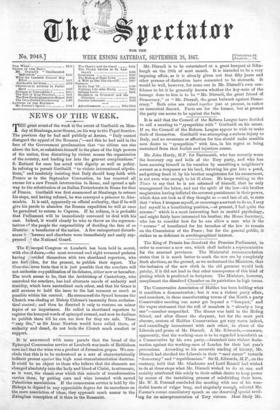It is announced with some parade that the bread of
the Episcopal Communion service at Lambeth was inade of Bethlehem corn 'and that the wine was a product of Jerusalem grapes. We con- clude that this is to be understood as a sort of characteristically indirect protest against the high semi-transubstantiation-doctrine. It could be no object to those who believe that the elements are changed absolutely into the' body and blood of Christ, to attenuate, as it were, the chasm over which this miracle of transformation carries them, by getting corn and wine invested with sacred Palestinian associations. If the communion service is held by the Bishops to depend in any appreciable degree for its sacredness on the mere association of ideas, they approach much nearer to the Zwinglian conception of it than to the Romanist.






























